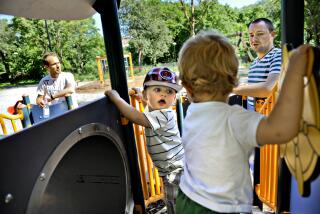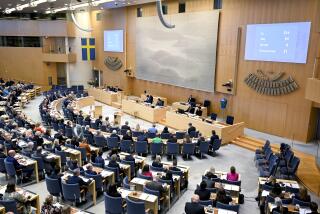Sweden Seeks to Bolster Gay Couples’ Right to Adopt
- Share via
STOCKHOLM — Swedes have long been social trailblazers in defining gay rights and blended-family values, but even in this liberal bastion the law still needs to catch up with common practice.
Lawmakers are now debating a bill that would give gay and lesbian couples the right to adopt children both in Sweden and abroad, and it is expected to easily win approval in June when parliament votes on the measure.
Supporters hail the legislation not only for aiming to rectify discrimination against same-sex couples, but also for the clarity it should bring to murky legalities surrounding children already growing up with gay parents.
“Such households exist in our society, and in increasing numbers, so we have to recognize that,” says Marianne Carlstrom, a lawmaker from Prime Minister Goran Persson’s Social Democratic Labor Party, which is sponsoring the bill. “We can’t address the needs of these children with gay parents unless we have a legal framework that includes the adoption issue.”
Under current law, a single parent of either sex can qualify for adoption if he or she passes an extensive state-administered battery of tests probing financial status, emotional stability and social environment. A friend or relative of the opposite sex of the adoptive parent must also commit to providing a gender model for the child.
But partners in registered same-sex relationships or marriages are ineligible to adopt, although the law is powerless to prevent a gay person who is single from adopting and bringing up the child with his or her partner. In-vitro fertilization also is restricted to heterosexuals--another inconsistency that parliament is expected to address simultaneously with the adoption law revisions.
The current legal gaps hamstring courts increasingly being called on to decide custody and support issues when gay couples with children separate through divorce or death. Legal rights favor the biological mother, but even those are ill-defined if the child was produced by unauthorized in-vitro fertilization.
Just last month, a court in the southern city of Orebro ruled that a 35-year-old man who had donated sperm for a lesbian couple’s three children is financially responsible for the offspring now that the partners have separated.
“These are the consequences of having obsolete laws. This case is being appealed, but it’s difficult to see how the court could rule any other way under the existing laws defining parental rights and responsibilities,” says Robert Karlsson Svard, information chief for the Swedish Federation for Lesbian, Gay, Bisexual and Transgender Rights.
Swedish family law still tends to define children and parental rights in the context of a traditional nuclear family, Svard says. With half of Swedish children born out of wedlock and more than a third of marriages ending in divorce, the legally enshrined model no longer applies to the majority of families, he notes.
The interest group with 6,500 members was consulted in the bill’s drafting and is satisfied with the changes it will bring, Svard says, adding that it will give Sweden the most liberal adoption framework in Europe. Gay adoption already is legal in the Netherlands but only applicable to children born in that country, which, like Sweden, has a dearth of children available for adoption because of liberal abortion and welfare laws.
Gay marriage has been legally recognized in Sweden since 1995, encouraging more openness about sexual orientation, Svard says. But neither the federation nor the government maintains statistics on the numbers of gay couples who have married.
Sweden’s legislation already has won endorsement by all political parties represented in parliament with the exception of the Christian Democrats and the right-of-center Moderates, Carlstrom says. That support should ensure a solid majority during a vote set for June 5 and its passage into law in 2003, she says. Nonetheless, a passionate debate is expected.
“There is opposition, even in my own party, but it is based more on emotion than facts. There’s not much research on same-sex couples as parents, but we have every reason to believe they are as stable and nurturing as heterosexual parents,” Carlstrom says.
Svard argues that the bar is probably set even higher for gay couples to qualify for adoption.
“There are more rigid demands on these parents, in the same way that a woman in a male-dominated workplace often has to work twice as hard to be successful,” he says.
More to Read
Sign up for Essential California
The most important California stories and recommendations in your inbox every morning.
You may occasionally receive promotional content from the Los Angeles Times.














